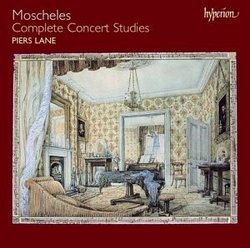| All Artists: Ignaz Moscheles, Piers Lane Title: Moscheles: Complete Concert Studies Members Wishing: 1 Total Copies: 0 Label: Hyperion UK Original Release Date: 1/1/2000 Re-Release Date: 1/13/2004 Album Type: Import Genre: Classical Styles: Chamber Music, Historical Periods, Classical (c.1770-1830) Number of Discs: 1 SwapaCD Credits: 1 UPC: 034571173948 |
Search - Ignaz Moscheles, Piers Lane :: Moscheles: Complete Concert Studies
 | Ignaz Moscheles, Piers Lane Moscheles: Complete Concert Studies Genre: Classical
|
Larger Image |
CD Details |
CD Reviews"They are not intended for pupils" Hexameron | 05/30/2007 (5 out of 5 stars) "Moscheles speaks aptly about his Etudes. He says "there are difficulties in them which only a master can overcome. Thalberg, Liszt, all such players will find their work cut out for them." Indeed, these are not Hanon or Czerny finger exercises, and Moscheles follows Chopin's example with technically advanced conceptions combined with equally significant music content. The Hyperion label has built a remarkable discography of Etudes ranging from the rarities of Henselt and Saint-Saens to the famous Scriabin and Rachmaninov. But Moscheles tends to be ignored these days, and I can think of no better champion to the rescue than Piers Lane.
Mendelssohn, who could be counted among Moscheles's pupils, thought highly of Moscheles's Op. 70 Studies and had even more praise for the Characteristic Studies Op. 95: "It is a long time since I have had any piano music I wanted to play over and over again..." Now, for those just listening to Liszt's or Chopin's Etudes, you will have to accept that Moscheles's do not reach the same planes. Nevertheless, they are fascinating, melodious little jewels. Decidedly, there are many original ideas here, too. Consider the first study, "Wrath" which echoes the early virtuosic style of Alkan and Liszt. The second, "Reconciliation" oozes with Schumannesque serenity. "Juno" is the real gem, though, enriched with Romantic volition and dramatic gusto. Then there's "Affection," whose name says it all: it's romantic Romantic music. The last of this set, "Terror" is another powerful miniature, one that is almost picturesque in its expressions, suggesting the fright one feels at some encroaching horrific entity. Moscheles's two sets of "Deux Etudes" Op. 98 and 105 contain seemingly better ideas than those found in the Characteristic Studies. "L'Enjouement" is whimsical and innocent enough, with its own gentle lyricism, but "L'Ambition" is the winner here. The haunting and beautiful main theme deceptively leads into a virtuosic central section that takes over with progressive climaxes until the end. The two Etudes of Op. 105 are even better! The first "Allegro scherzoso" is a study in "very rapid repeated notes" played at a whispering piano dynamic. The "Allegro feroce" is a brilliant tour-de-force notable as much for its melodic charm as for its bravura. Interestingly but not surprisingly, Liszt is reported to have "played both studies admirably at sight from the manuscript." Moscheles's Op. 111 Etudes are mature works that have undeniable beauties. The first, "Reverie et Allegresse" or "Dreaming and Playfulness" is both tranquil and amusing. The second, "Le Carillon" starts off giddy, like a Mendelssohn miniature, but moves inexorably towards an explosive flourish. "Tendress et Exaltation" is indeed a tender and exalted piece with a satisfying melancholy and turn of phrasing. Again, the piece increases in virtuosic splendor towards the end. But if there's a single highlight of this set of four Etudes, "La Fougue" or "impetuosity and passion" is definitely the one. This demonic work exudes the influence of Liszt and especially the stormy moments of Chopin. Unfortunately, the Grande Etude Op. 126 is nothing extraordinary and reverts back to some of the youthful sounding pieces of the Op. 95. Bottom line: Without sounding imitative of his contemporaries and surely without being mediocre, Moscheles shines in his marvelous Etudes. Sometimes Moscheles is stamped with the "Mozartean" adjective when describing his style, particularly in his Piano Concerti, but in his Etudes he rarely mimics Mozart piano writing at all. Instead, he proves that he can and did move with the times, producing very Romantic music and worthy contributions to the Etude genre. Hyperion's release of these works is about the best you can get: perfect sound engineering and a colossal performer, Piers Lane, make this a great buy." |

 Track Listings (25) - Disc #1
Track Listings (25) - Disc #1